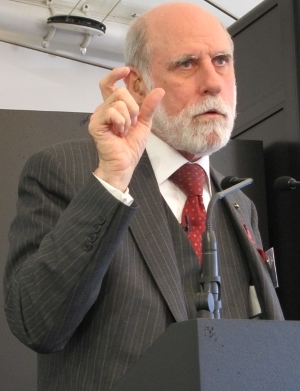Cerf: UK government should offer IPv6 upgrade tax credit

The government should offer tax credits to businesses that upgrade their networking equipment to support IPv6, according to Vint Cerf, who is widely regarded as one of the founders of the internet.
Cerf, who co-invented TCP/IP, said on Thursday that businesses in the UK and the rest of Europe risked being cut off from customers in parts of the world that do have widespread IPv6 support. There will be no more IPv4 addresses available within two years' time, meaning no new people or devices will be able to be added to the internet using this legacy address type.

Cerf said that, without a move to IPv6, the UK internet industry "will not be able to grow". Photo credit: David Meyer
Speaking at the launch of 6UK on Thursday, an organisation devoted to getting the country switched over to the new version of the internet protocol, Cerf — now Google's chief internet evangelist — said businesses using the IPv6 protocol version should get financial incentives.
"I would suggest that some thought be given to tax credits for the upgrade of equipment to IPv6 capability," Cerf said, addressing his comments at David Hendon, information economy director at the Department for Business, Innovation and Skills (BIS), who had just finished speaking as a stand-in for BIS minister Ed Vaizey.
"Creating some business incentives might be helpful," Cerf added, citing the US government's 'cash for clunkers' scheme — a programme, formally called the Car Allowance Rebate System, that was used in 2009 to encourage people to trade in old cars for more fuel-efficient replacements — as a suitable analogy.
IPv6 is the successor to IPv4, the current version of the internet protocol (IP) that has been used for three decades. The protocol uses 32-bit addresses, the limited permutations of which mean only 4.3 billion IPv4 addresses are possible. Around the middle of next year, central reserves of unallocated IPv4 addresses will hit the five-percent mark, at which point those remaining addresses will be automatically split between the five regional registries.
Once those addresses have been allocated to end-users, it will not be possible to add any more users or devices to the internet without resorting to an IPv4 address resale market — this would be of limited use, as millions of connected devices are going on the market every year in the move to the 'internet of things'. IPv6 uses 128-bit addresses, meaning the new version of the protocol can support more than 340 trillion, trillion, trillion permutations.
Most routers and other equipment built to support IPv4 cannot use IPv6, so much of it will have to be upgraded or replaced — it is this shift that Cerf proposed the government supports. In his speech, Hendon had said that "the private sector must realise that adopting IPv6 is in their own best interest".
"Apart from raising awareness of the problem, we also wanted to provide some leadership," Hendon said, adding that the government would support IPv6 "as far as we can in future purchasing and to use it wherever we can". He did not, however, respond to Cerf's proposal. The treasury had also not responded to a request for comment at the time of writing.
In his speech, Cerf noted that it was important for businesses to "not simply to have connectivity and an ability to reach the domestic audience", but also to reach a global audience. Asia is "at the top of the list" when it comes to IPv6 deployment, he pointed out.
Cerf also had several recommendations for the government's plan to stimulate a mini-Silicon Valley in London's east end. He pointed out that the real Silicon Valley had succeeded in part because the US has a business culture that accepts failure. "One thing we all have in common is we've all failed at some time and it didn't put the Mark of Cain on our forehead," he said in reference to himself, Steve Jobs and others, adding: "In Europe, that's generally not the case." He also said access to venture capital and a "vibrant stock market" were prerequisites for success.
"We need to figure out what's missing, if anything, here in the UK," Cerf said. "Implementing IPv6 will not turn London into Silicon Valley, but it's important because, in its absence, the internet industry will not be able to grow."
Cerf was also one of several speakers at the event to warn that network address translation (NAT), a method frequently used to have one IP address serve many people within an organisation, was an undesirable way of delaying the shift to IPv6. "NAT is not going to solve the problem," he said.
6UK co-secretary Jim Reid said NAT "doesn't scale well, is clunky, and is ultimately more costly to run in the long run".
"There are going to be parts of the world where IPv4 is no longer available," Reid said. "For example, China has bitten the bullet. If you don't have IPv6, your customers are not going to be able to talk to you easily and you're not going to be able to talk to them easily. I'm already seeing this happen, as with an investment bank that tells me they need IPv6 to talk to their customers in Asia."
Reid, who said he got his first piece of spam over IPv6 a couple of weeks ago, recommended that businesses start preparing to shift to IPv6 now.
"Check what in your network can and can't speak IPv6," he said. "Develop a migration and adoption plan. Check when your ISP will run out [of IPv4 addresses]. Get IPv6 into your DNS, into your web servers, email servers, anything that sits on the public internet."